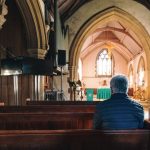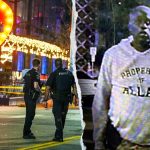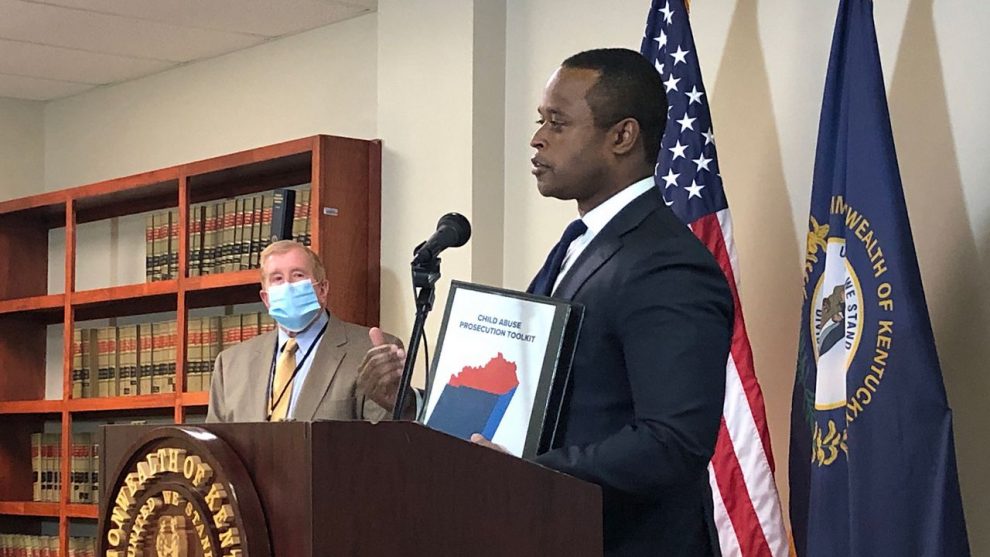One day after a three-judge panel sided against him in his lawsuit to keep classrooms at religious schools open during the pandemic, Kentucky Attorney General Daniel Cameron asked the U.S. Supreme Court to stymie Gov. Andy Beshear’s ban on in-person classes.
He said Monday he filed an emergency application asking the court to essentially uphold a U.S. District Court judge’s earlier decision to prevent the enforcement of Beshear’s executive order against religious schools, despite the subsequent Circuit Court ruling in the governor’s favor.
“The U.S. Supreme Court has already ruled that religious institutions cannot be treated different than secular activities, and we are asking the court to simply apply the same analysis to the Governor’s disparate treatment of religious schools and other secular activities,” Cameron, a Republican, said in a news release. “We’re committed to pursuing every available option to protect the constitutional rights of Kentuckians, and today’s filing with the Supreme Court is the next step.”
Hours before he announced the emergency application, Cameron telegraphed his plan to take the case to the nation’s most powerful court in a television interview.
“We’re ready to send our case to the Supreme Court,” he said Monday morning on Fox News’ “Fox and Friends.” “We’ll be applying for review by the Supreme Court hopefully today.”
He said Beshear has infringed on the First Amendment rights of many around the commonwealth with his latest executive order, which halted all in-person classes at both public and private schools across Kentucky.
Many districts — including Jefferson County Public Schools, which covers nearly 100,000 Louisville children — were already taking part in non-traditional instruction online. But a number of private schools across the state had brought students into the classroom during the fall semester.
Beshear’s Nov. 18 order, which was struck down by a U.S. District Court judge before being upheld in Sunday morning’s Circuit Court ruling, closed all schools regardless of any religious affiliations through the end of the semester. The only exception was for elementary schools in counties outside the “red zone,” which may reopen Dec. 7 if the school follows all guidelines.
A county is in the red zone if it has 25 or more COVID-19 cases per 100,000 people.
Cameron told the Fox News hosts that attending a religious school “is an act of worship within itself” and that limiting attendance at those classes violates students’ First Amendment rights.
“You have to have a delicate balance in terms of keeping people safe and respecting the constitutional rights of our citizens,” the attorney general said. “What (Beshear) has done repeatedly is infringe upon the First Amendment free exercise of religion here in the Commonwealth of Kentucky…”
Last week, the Supreme Court temporarily blocked restrictions put in place in New York that would have restricted large gatherings at places of worship, saying the governor’s restrictions, “by effectively barring many from attending religious services, strike at the very heart of the First Amendment’s guarantee of religious liberty.”
But Sixth Circuit judges who ruled Sunday in the Kentucky lawsuit said since Beshear’s order applied to public and private schools alike, that case and the New York ruling “are therefore distinguishable.”
Beshear has said the Circuit Court “recognized that we must all do our part over the next several weeks to slow this virus.”
“While we all want to get our kids back to in-person instruction, the United States Court of Appeals for the Sixth Circuit recognized that doing so now would endanger the health and lives of Kentucky children, educators and families,” Beshear wrote Sunday. “To help save more lives and defeat this virus we need everyone to do their part.”
The Texas-based firm First Liberty Institute, which represents Danville Christian Academy in this case, joined Cameron in filing Monday’s application with the nation’s highest court.
Roger Byron, senior counsel at First Liberty, made it clear in a news release that the firm disagrees with the Sixth Circuit Court’s ruling.
“As a result of the appellate panel’s order, Kentucky students can catch a matinee at the movie theater, attend a wedding, go bowling, work out at the gym, or go shopping, or even attend in-person classes at a preschool or college, but they cannot attend an in-person class at a K-12 religious school,” Byron said. “Even gambling parlors are still open and in-person.”
Beshear cited the rising number of coronavirus cases in Kentucky in issuing the executive order this month. His restrictions also cracked down on gatherings at restaurants, bars, gyms, offices, weddings, funerals and other indoor events until mid-December.
Related:What to know about each of Kentucky’s new coronavirus restrictions
Cameron joined Danville Christian Academy, a Boyle County religious school with more than 200 students, in a lawsuit against the governor days later. Their filing argued the crackdown violated the religious rights afforded to citizens in the First Amendment along with Kentucky’s Religious Freedom Restoration Act.
On Wednesday, U.S. District Judge Gregory Van Tatenhove issued a temporary injunction allowing religious schools to let children into its classrooms, noting that offices and other notable gathering points had not been closed and private religious schools have specific constitutional protections. Four days later, though, the Circuit Court board reversed that decision, as classrooms and children “pose unique problems for public health officials responding to the COVID-19 pandemic.”
Story cited here.
























